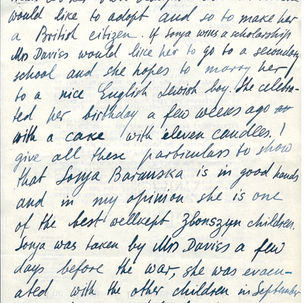
Complicating narratives of the Kindertransport
Digital Exhibition
Born 12.2.23 in Vienna.
This collection focuses on carer motivations and family separation.


Sonja (l) and Estera (r) Barnaska age 7
(MS 183 575 Folder 1, Special Collections, Hartley Library, University of Southampton)
Sonja and Estera Baranska were identical twins born 18.1.31 in Barmen, Germany. They had three older siblings-two sisters and a brother- and one younger brother. Their mother died when the twins were four. One older sister, Leni, was sent to distant relatives in the United States in early 1938 at the age of eleven and the rest of the family intended to follow, but they were deported to Zbąszyń, Poland on 28 October 1938 during the Polenaktion before they were able to join Leni. The twins and their younger brother Rolf were all accepted on a Kindertransport arranged by the Polish Jewish Refugee Fund but at the last moment Rolf was struck off the list due to the fact he had conjunctivitis. The twins arrived in Britain on 30 August 1939 and were immediately separated. Esther went to a well-off Jewish family with grown sons in Birmingham and Sonja to a childless working-class Jewish couple in London’s East End. Both girls remained with their foster families until they married. After the war, they learned their father and three siblings had been murdered in the Holocaust, but they had no idea how to locate their sister Leni in America. In 1956, through a fortuitous series of events, Leni, who had been searching for her sisters for seventeen years, finally located Sonja and through her Estera. Sonja and her British husband, who had twin baby girls of their own, chose to emigrate to Houston, Texas to join Leni and remained there for the rest of their lives. Estera married and remained in Britain.


Sonja with her foster parents Sid and Kit Davies ca 1945
Estera in riding jodhpurs ca 1947
Images used with permission of Bernhard Rosenfeld.

Sonja and her brother Rolf, ca 1937
Image used with permission of Bernhard Rosenfeld.
The PJRF did what they could to arrange for the twins to keep in contact (Documents 2 and 5), but proved ineffectual against the Birmingham committee’s obstruction. Sonja’s foster mother expressed her appreciation for these efforts (Document 6) and revealed how much the estrangement, which by this time had lasted three years, distressed Sonja. Her letter also revealed one reason why the refugee organisation did not fight harder against the Birmingham family. Both girls were living with Jewish families who treated them as their own and significantly, did not ask for any money from the Fund. It is likely that the PJRF was loathe to disturb these arrangements, which were in one sense happy ones for the girls. However, Estera was not allowed to meet her sister until 1944, by which time the girls were virtual strangers to one another—and remained thus estranged for most of the remained of their lives. This is a case in which carer motivations can be interrogated and the complications of the Kindertransport are fully in evidence.
Family separation and carer motivation are inextricably tied together in this case study. The girls, who were only eight when they left their father and siblings, and had been tragically separated from their baby brother Rolf at the ship that took them to England, were then separated from one another for almost the duration of the war, due not to unforeseen circumstances, but because one of the foster mothers wished to keep them apart. The Fund’s home visitor, Dr Litvin wrote an impassioned report after a home visit to Sonja’s foster mother (Document 3), which although toned down in the official typed version (Document 4), clearly shows the reluctance of the well-off Birmingham family to associate with their foster daughter’s twin and her foster family. Higher social and economic status were at the root of their unwillingness to allow the children to maintain contact, and this is confirmed in the letters written by the Birmingham Council for Refugees (Documents 1 and 7), which appeared to support Estera’s foster family above any consideration for the children’s family connection.
The below documents are from the Schonfeld Collection (MS 183) at the Special Collection, Hartley Library, University of Southampton. All of the below documents are used with permission of the University of Southampton Special Collections.
Please navigate the thumbnails below to view the full-size documents. Each document is accompanied by a description and archive reference.













